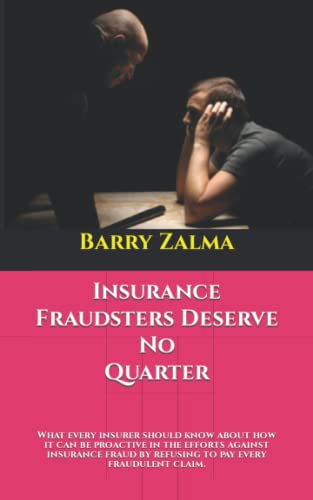Insurance Fraudsters Deserve No Quarter

What every insurer should know about how it can be proactive in the efforts against insurance fraud by refusing to pay every fraudulent claim, by refusing to settle litigation brought by fraud perpetrators and by proactively taking the fraud perpetrators to court by seeking damages for common law fraud and take the profit out of insurance fraud.
No one knows the true extent of insurance fraud because most attempts at insurance fraud succeed. Estimates are extrapolated from those few people who attempt insurance fraud that are caught.
Insurance fraud is a crime in most states of the United States and in most countries the usual victims of the crime of insurance fraud are insurers. Some creative people have created fraudulent insurance companies that exist to defraud the insurance buying public who acquire insurance from the fraudulent insurers.
The crime of insurance fraud is ubiquitous and is committed by every race, gender, national origin, religion, or sexual orientation.
Unlike other victims of crime state legislatures require insurers create special investigative units (SIU) to thoroughly investigate all potential insurance fraud and present evidence to the authorities so that they can prosecute insurance fraud. Unfortunately, experience of the insurance industry has established that even when the insurer’s SIU presents a case to the state’s Fraud Division or Fraud Bureau for criminal prosecution, it is rare that a prosecution is commenced and a conviction obtained.
State insurance departments brag about convictions in double digits when they receive as many as 1500 reports of suspected fraudulent claims every 30 days. Prosecutors dislike insurance fraud cases because they are usually document heavy while an assault, rape, murder or drunk driving are usually summarized by a single police report and are, therefore, relatively easy to prosecute to a jury or obtain a plea of guilty.
Some insurers are buying Artificial Intelligence software to detect insurance fraud. Others hire retired police officers to operate the SIU and ignore their experienced insurance claims handlers.
Most do the minimum necessary to fulfill the requirements of the anti-fraud statutes and regulations concluding that it is better to pay the fraudsters than to fight fraud attempts proactively.
All insurers and those who regulate insurers agree that regardless of where the insurance is sold, regardless of where the promises made by an insurance policy are required to indemnify an insured, insurance fraud is a serious problem for the insurance industry. All attempt to deter or defeat insurance fraud to one extent or another.
All recognize that if there is an insurance claims that is denied for fraud it is axiomatic that the insured, so accused, will file suit for breach of contract and for the tort of bad faith. Bad faith lawsuits, even when they fail, take the value out of the effort to deter or defeat insurance fraud since defense of the bad faith suit will usually exceed the amount of the claim that was denied.
On an individual claim basis it is never cost effective to reject the claim for fraud. However, knowledgeable insurance fraud investigative professionals recognize that an aggressive effort against insurance fraud, refusal to pay a settlement to avoid litigation, and forcing the fraud perpetrator to litigate through trial and appeal will become known to those who make a living defrauding insurers, that the insurer is not a pushover and will avoid fraud attempts against that insurer and move to insurers the fraud perpetrators know will pay rather than fight.







